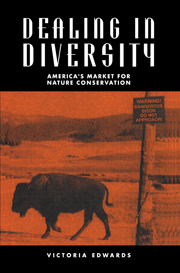Book contents
- Frontmatter
- Contents
- Preface
- Acknowledgments
- 1 Introduction: private provision of conservation
- 2 The conservation market
- 3 Collective action
- 4 Protection mechanisms and incentives
- 5 Fee-hunting
- 6 Watchable wildlife
- 7 Turning development into conservation
- 8 Conservation partners
- 9 Towards a more holistic approach
- References
- Index
9 - Towards a more holistic approach
Published online by Cambridge University Press: 19 January 2010
- Frontmatter
- Contents
- Preface
- Acknowledgments
- 1 Introduction: private provision of conservation
- 2 The conservation market
- 3 Collective action
- 4 Protection mechanisms and incentives
- 5 Fee-hunting
- 6 Watchable wildlife
- 7 Turning development into conservation
- 8 Conservation partners
- 9 Towards a more holistic approach
- References
- Index
Summary
In general, the trend of the evidence indicates that in land, just as in the human body, the symptoms may lie in one organ and the cause in another. The practices we now call conservation are, to a large extent, local alleviations of biotic pain. They are necessary, but they must not be confused with cures. The art of land doctoring is being practiced with vigor, but the science of land health is yet to be born.
Aldo Leopold (Wilderness)The market for nature conservation
Chapter 1 of this book explains the importance of the conservation of wildlife and habitat on private land. The sheer size of the private domain dictates that it is essential we understand and improve the means of protecting natural areas on such land. Traditionally, the benefits associated with the protection of natural areas have been regarded as ‘nonrival’ (one person's enjoyment has no effect on the enjoyment of another) and ‘nonexcludable’ (it is impossible to exclude people from enjoying the benefits). Assumptions of this type lead to a bias towards government supply of nature conservation and/or government regulations over private land. Chapter 2 stresses that natural areas are capable of producing a whole range of benefits, some of which can be captured and a charge levied. It explains that by exercising control over access to the benefits to be enjoyed from natural areas, private landowners can produce goods and services that are compatible with the protection of a natural area and also allow them to recover some of the costs of conservation.
- Type
- Chapter
- Information
- Dealing in DiversityAmerica's Market for Nature Conservation, pp. 155 - 167Publisher: Cambridge University PressPrint publication year: 1995



